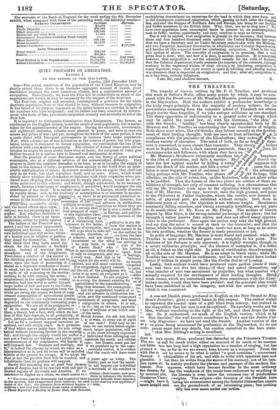THE THEATRES.
The tragedy of Garcia, written by Mr. F. G. Tomlins, and produced this week at Sadler's Wells, offers many points by which it may be corn- pared with the Strathmore of Mr. Westland Marston, produced last summer at the Haymarket. Both the authors exhibit a profounder knowledge of the truly tragic principle than the majority of modern writers; for the productions emanating from the romantic school of Elizabeth are oftener tragic stories than tragedies, if we take antique collisions as our standard. The sharp opposition of individuality to a general order of things which may be called the moral law, or, with the Germans, "the idea," or, with the Greeks, "fatality," has been clearly apprehended both by Mr. Marston and Mr. Tomlins as constituting the true foundation of tragedy. Both shine most when, like old Greeks, they labour severely at the develop- ment of their leading thought; 'both are seen to least advantage.* &A, in compliance with the prejudice of the Elizabethans, they endow," ire, in- troduce variety of character. The mind of both, as far as drag :vb struc- ture is concerned, is more classic than romantic. They shouto c looked
more to Sophocles, who is their natural patriarch, than t4, ere, his
contemporaries and followers, with whom they have no, • • cf"A.,f Mr. Marston's Strizthmore voluntarily sacrifices hill.01"-ilet., happiness to the idea of patriotism, and falls a martyr. Mee :47.c.,! Garcia vio-
lates the law against murder by killing a witne, ,afs •efe supposes will
cause the death of his mother, and falls a crimi-e5 04' . cases the col-
lision is most important, and of universal ho"' the advantage
being perhaps with Mr. Tomlins, who places .PI „.41_,.;.Y.Af feelings, faint affection, on the side of crime, but, unlike Kotzebue, nfles not allow crime to be justified. That the heroes of the two pieces are neither of them ex- hibitions of strength, but only of constant suffering, is a circumstance that will lay Mr. Tomlins's work open to the objections which were made to that of Mr. Marston. He may, however, take the high ground, and point to the Philoetedes of Father Sophocles, where the results, now deemed ig- noble, of physical pain, are exhibited without scruple. Still, from an histrionic point of view, the objection is not without weight. Strathmore constantly falling senseless, and Garcia constantly trembling, are not parts to do much either for Mr. Kean or Mr. Phelps. The mother of Garcia, played by Miss Glyn, is the strong-minded personage of the piece; but her strength is rather passive than active, and does not afford many opportu- nities to the performer. Here again the author may take the high ground, and say that the actor is second in rank to the dramatist; and that the latter, while he elaborates his thoughts, needs not care, as long as he solves his own problem, whether the former is made prominent or not.
In point of language, Mr. Marston is more fluent and poetical; while Mr. Tomlins is more practical and goes more straightly to his point. The baldness of his dialogue is only apparent: it is highly wrought, though on a severe utilitarian principle; and the absence of metaphor is, if a defect at all, a defect on the right side. In point of versification, the advantage is all on the side of Mr. Marston. He is an adept in blank verse; while Mr. Tomlins has not mastered its rudiments, and his work would have looked better if written in simple prose, like the Emilia Galotti of Leasing.
Lastly, both authors would have produced more perfect pieces if their sots had been not five but three,—if they had asked themselves, n what number of acts was sanctioned by prejudice, but what number w actually required for the development of their leading thoughts. Man weak scones, which are introduced merely from compliance with the Eliza- • ■ bethan model, would then have been avoided; and the principal idea would 4 have been exhibited in all its integrity, and with the severe purity with which it was conceived.


























 Previous page
Previous page